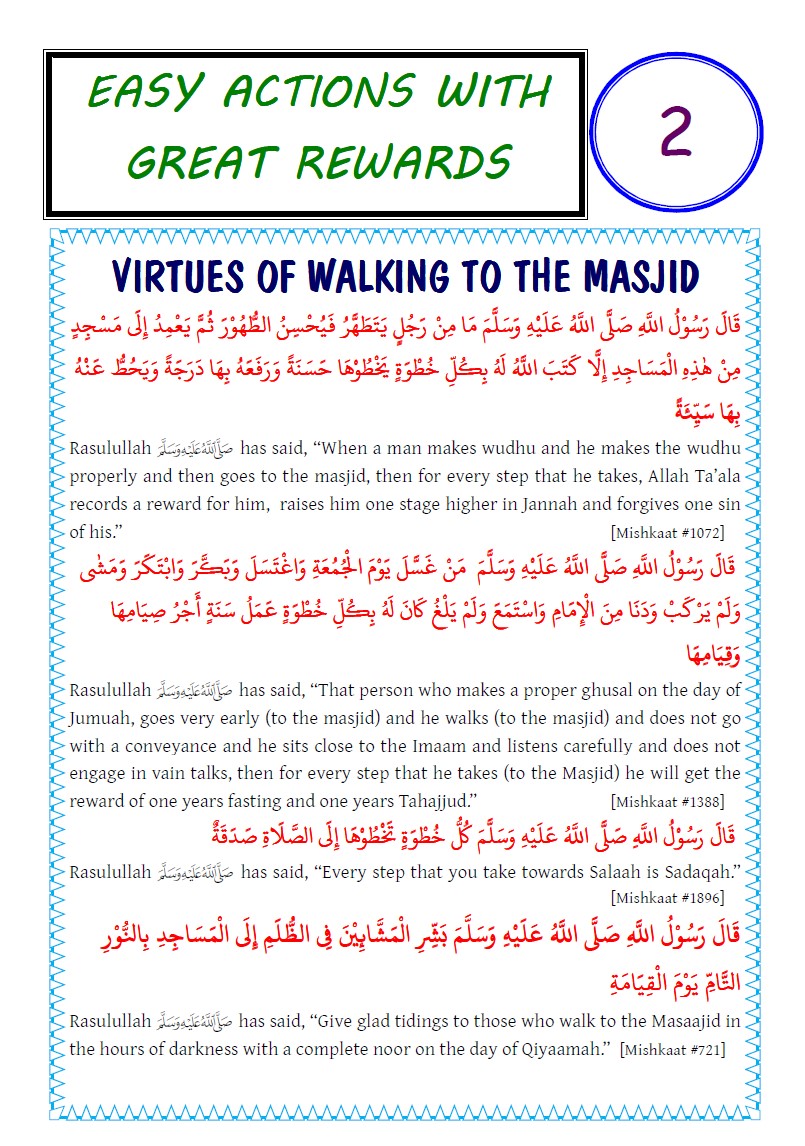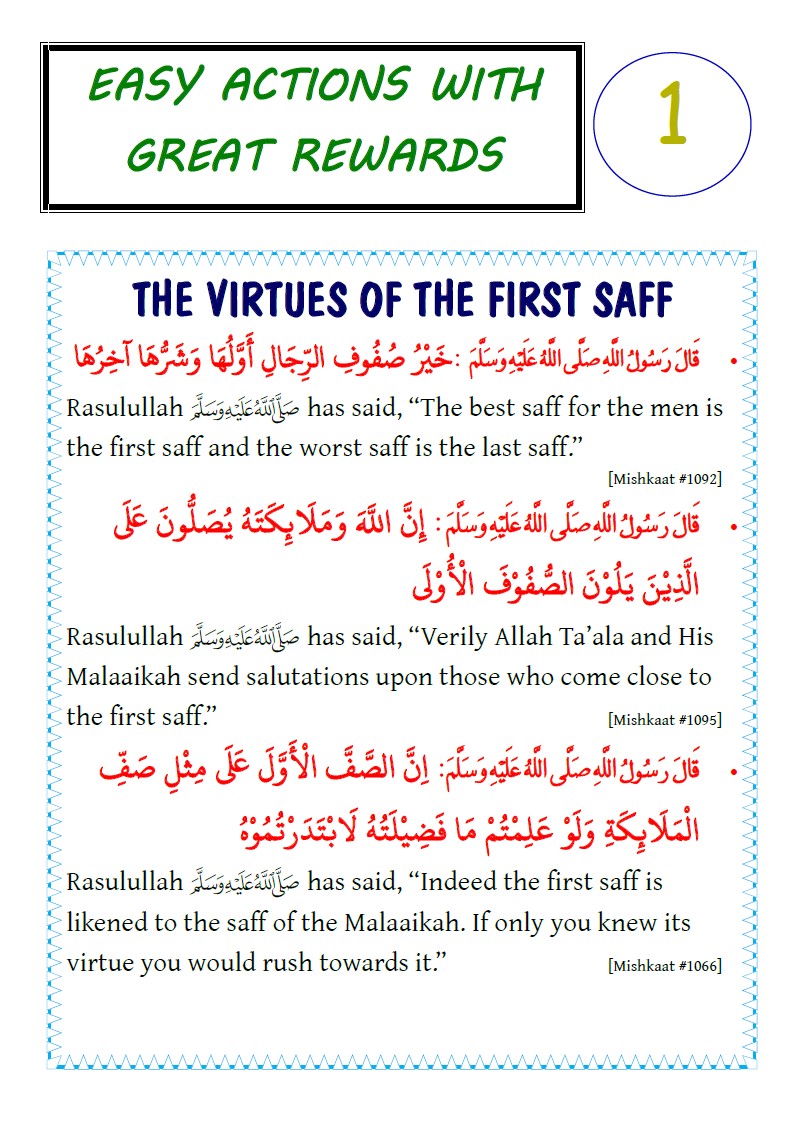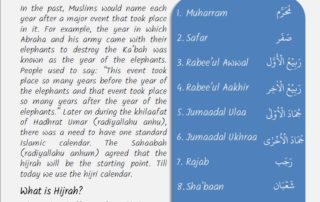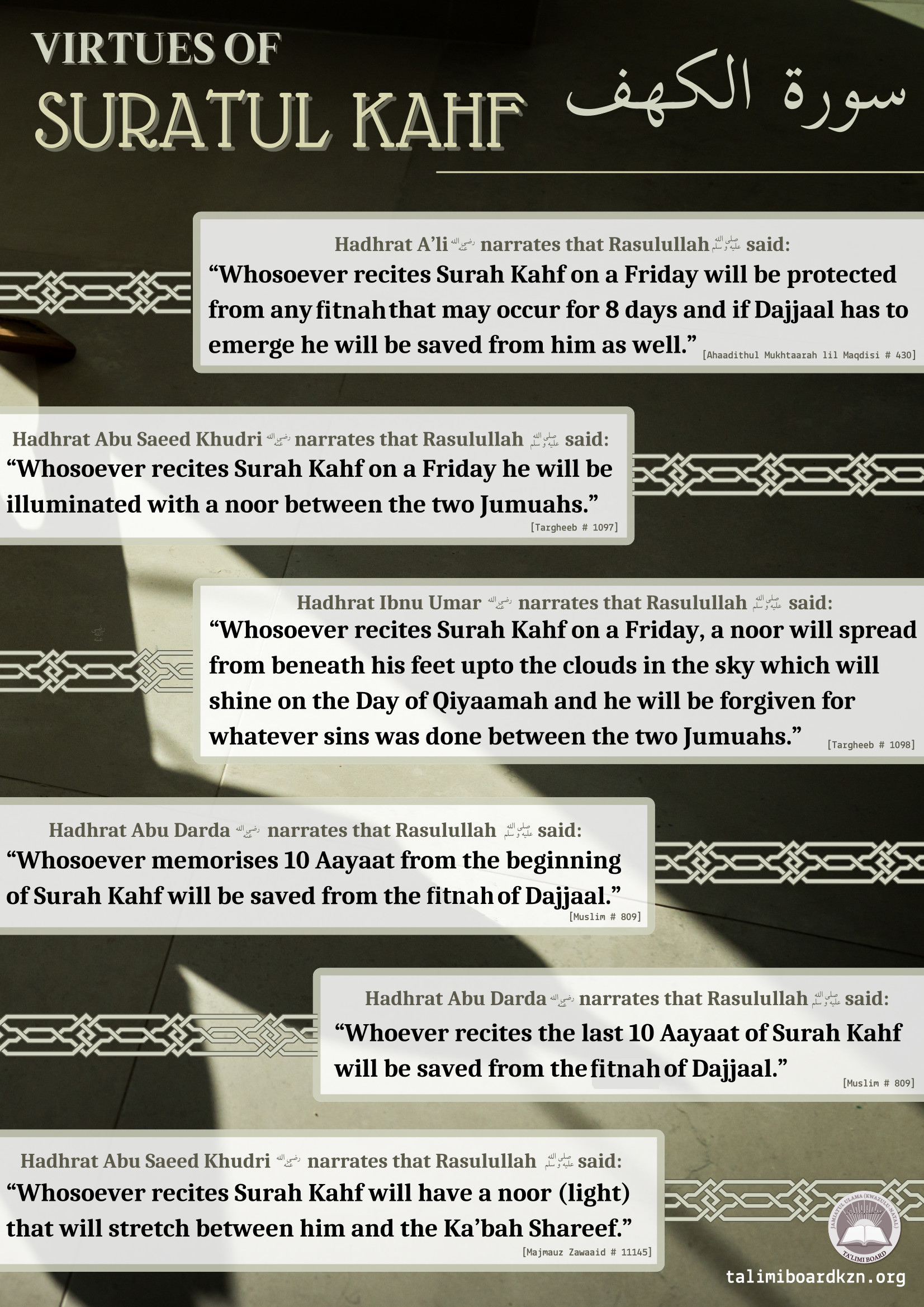Maktab Teachers Muzaakarh Workshop – July 2022
Qiraat
Ml Hamzah Adamjee
Introduction
Ml Ismail Adamjee
My Ustadh Ml Dawood Padia
Ml Imtiaz Kathrada
Tarbiyat
Ml Ismail Bayat
Surahs and Duas
Ml Aslam Padia
General Advice
Ml Huzaifah Qaasim
—————————————————————————————–
Teaching methods of an experienced Muallimah in Phoenix – Grade 6, 7 and 8
Introduction
I have noted down a few points and ideas which I have implemented and used over the years of teaching which alhamdulillah has worked very well for me and I have achieved the desired results. I teach the grades 6, 7 and 8 girls. I hope Insha Allah these notes can be of benefit for other Apas as well.
Qur-aan and Tajweed
Firstly, when I get my class at the beginning of the year, on the first, I do the proper pronunciation of all the Arabic alphabets with the correct Makhaaarij. I explain to them the importance of Tajweed and write the following examples on the board to illustrate the difference in the meaning just by reading 1 letter incorrectly:
اَللّٰهُمَّ طَهِّرْ قَلْبِيْ
O Allah purify my heart
So just by reading ك instead of ق you are actually saying كلبي) O Allah purify my dog)
وَ اللّٰهُ سَمِيْعٌ عَلِيْمٌ
And Allah is All hearing All knowing
by saying اليمwith an Alif instead of ع it means painful. So you are actually saying Allah is All hearing, painful. (Na’oozhu billah).
By then the girls are already so shocked and some are laughing at the first example. So Alhamdulillah the point is understood that we need to be reading every letter correctly otherwise it will change the meaning of the Quraan. In January when we do Quraan sabaq I only do 3 lines sabaq for the month of January. I teach the sabaq to them on the board with all the markings. That is so that the girls get used to reading correctly, with proper makhaarij and so that the fluency comes right and they are not stopping after every 2/3 words. Once they get used to how I want them to read, their sabaq increases individually according to their reading. I correct every single mistake each pupil makes. Even if it’s 10 mistakes. Don’t overlook even the smallest mistake. By setting this trend the students know exactly how you want your work. You have to set your standard of work from day 1. You can’t start off being lenient with tajweed and then afterwards try to get them to start reading with tajweed. The most common mistakes I find when they read Quraan are the open and closed letters and Tashdeed. All concepts are shown on the board. Any mistake the child makes is shown on the board with the correct and incorrect version so they can physically see and understand what they are reading and what it was supposed to be read as. I teach every concept of tajweed for a week. If I need 2 weeks we do it over 2 weeks e.g. Ikhfaa letters. For example, if we are doing full mouth letters this week, only full mouth letters is done from Monday to Friday. The girls must say it to me every single day whenever they get a chance. They have a tajweed book where they find 2 examples each and write it down. Then next week the tongue letters. Then ghunna and so on.
If the girls read any tajweed rule that we have already done incorrectly, then I do not tell them the correct answer. They must go to the tajweed corner where the rules of tajweed charts are in the class or open their tajweed books, find it and tell me the rule. In this way they are not being spoon fed, but rather finding the answer for themselves. Learners in grade 6 must get tested their Quran sabaq by a grade 7 or 8 learner before coming to me for testing. All sabaqs must be marked otherwise I will not test them their sabaq. Learners are constantly reminded to read clearly, slowly and open their mouths and read loudly. Many of them don’t open their mouths and read clearly so they have to be constantly reminded.
General
When I enter the class I write all the work that needs to be tested for the day on the board. After 1 or 2 months the girls know exactly how its done and they write it on the board themselves. This saves time and disruption in the class where each student who comes in doesn’t have to ask me: “Apa what are we doing for suras, duas or Fiqh etc…?” When they enter the class, they can find everything to do on the board and come for whatever they are ready with, but they must complete whatever work is on the board. Due to having a big class and multiple grades you have to multi test as well. So someone comes for Quraan on my right, then another child to my left for duas, or surahs or hadith etc. At other times they test their partners as well. Lots and lots and loads of praises, ‘Masha Allah’ and ‘I really love how you read today’ ‘I really enjoyed listening to your beautiful recitation.’ Its surprising how excited and over the moon they get just to be told Masha Allah. They were extremely happy and excited when the examiner who took their exams told them Masha Allah on their exam day. They can’t get over that and told me over and over that the examiner actually told us we read so well Masha Allah. Kids love to hear they are improving. So even if they not reading too well I tell them Masha Allah and tell them they are doing great and they have improved, and they need to keep it up and I explain to them what they need to focus on and where their weaknesses are. They all have partners in the class. So before getting tested any subject they get tested by their partner before coming to me. 98% don’t learn at home. I have come to terms with that and accepted that. So I do give them time in class to learn. I tell them that if they didn’t learn or go over their work, they must please learn in class before coming to me so they don’t have to get shouting. Bigger girls don’t want you to complain to their parents regarding their slow progress. I only do it in extreme cases.
Surahs / Duas / Hadith
While testing Suras, Duas, Hadith or written subjects, if they make a mistake I do not tell the correct answer. They must look inside themselves and read it from the kitaab. I find it works better as they remember their mistakes in future. Revision is done throughout the year for all subjects. So exam time no one is stressing as all past year surahs, duas and Hadith is done continuously. 99 names of Allah is done every single day.
Revision
One round of revision is done every single week as follows
SURAHS EVERY WEEK
Mon: Surahs grade R/1 and 2
Wed :Surahs grade 3/ 4 and Sura Duha of gr 5
SURA YASEEN is done every day Monday to Thurs from the beginning of the current ruku and revision of 1
previous ruku. They get 1 aayah of sabaq every day even though its not a surah day.
Mon: Ruku 1 plus the ruku of current sabaq
Tues: Ruku 2 plus the ruku of current sabaq
Wed: Ruku 3 plus the ruku of current sabaq
Thurs: Ruku 4 plus ruku of current sabaq
Ruku 5 gets done every day
The same with Surah Mulk
1 p.g. per day revision plus current sabaq page.
DUAS & HADITH REVISION EVERY WEEK
TUES: revision of gr 1/2/3 plus 6 (current grade)
THURS: Revision of gr 4/5 plus 6 (current grade)
WED: ONLY Hadith gr 6 or 7 with lessons
Alhamdulillah our dedicated Apas of the previous grades are also doing a wonderful job teaching and
laying the foundation for us in the bigger grades.
Fridays
On Fridays I only do Quraan sabaq, the 1 aayah of Surah Yaaseen or Mulk and Tuhfatul Banaat. I give the girls time after that to just take a break and relax as they work very hard during the week. They look forward to that. So we talk together as a class about whats happening in school and challenges they face. Sometimes I make popcorn, pancakes, pizza, cakes, dessert, chips, etc. for them and while eating we play a sunnats game. We have to say the different sunnats without repeating what was already said. That is like their weekly incentive which they look forward to. Any pupil who didn’t finish any work during the week will have to catch up on a Friday during play time. (Which they obviously try to avoid)
Compassion
Before they leave madrasah to go home I tell them I love you all and I can’t wait to see you all tomorrow. I also give them a hug. They must know that you enjoy having them around and you love teaching them. They love that. Many of them come from broken homes or have lost their parents. They crave love and attention.
Dua to Allah Ta’ala
After salaah when we all make dua, we say;
O ALLAH PLEASE HELP ME AND MAKE ALL MY WORK EASY FOR ME. I AM LEARNING FOR YOUR PLEASURE SO PLEASE ACCEPT IT AND MAKE ME A PRACTICING MUSLIM. AAMEEN.
Also not forgetting always make dua for them. Take their names. Read 2 rakaat saalah and ask Allah Ta’ala for help. Before their exam they read 2 rakaats salaah in class and make dua.
Written Subjects
I make sure I test the previous lesson I taught thoroughly before teaching a new lesson. If they don’t know it either I redo it or I give them time to learn and then test them. This works really well as every lesson is learnt thoroughly. If you do not test them, they will not learn, because they know they are not being tested. TEST THOROUGHLY A-Z ALL worksheets must be completed after each lesson. I finish the syllabus early so there’s enough time for revisions and tests. By the 1st week of the 2nd term all my half yearly written subjects are done. There’s enough time for tests, revisions and corrections. Do lots of test papers with them so they understand how to answer questions. It’s a sad reality that as big as they are, their level of reading and understanding is very very poor. This will really help them. When they get an answer wrong, I don’t tell them the correct answer. They must find it themselves and do corrections. Partner testing works great before coming to you. Put a weaker child with a bright child. When doing tests corrections are increased per test. E.g. first test 1 time, second test 2 times, third test 3 times and so on. Closer to the exam I test each child orally from their text book like 3 girls per day. Whatever they don’t know I put a cross so they know where to concentrate and where their weaknesses are. Then they are called again to be tested all the crossed one’s. Make their work easy for them. I make worksheets for them for e.g, a worksheets with all the terms from the kitaab. Worksheets with all the names for history. Worksheets with all dates and important details. Short note points. Easy points. It makes their learning easier as everything is found on 1 page instead of them searching through the entire kitaab for all the different terms, names etc. I don’t mind sharing it with other Apas should they need it as I have copies. When I teach grade 6 history, they find it very difficult because of all the battles, names, dates, etc. I try and finish the kitaab early so we have enough time for thorough revision. So for the 2nd half of the year when I teach, I teach one lesson from the front which is a battle and 1 lesson from the back which is not a battle. E.g. Battle of Muta (front) and mu’jizaat (from the back). So what’s happening is that they are learning 2 lessons at one time but its not too difficult because only 1 lesson is a battle. In this way the kitaab is finished earlier and there is more time for revision and tests. Since we do have exams for practicals, sunnats and tuhfatul banaat, we must have time for that revision as well. This year I tried this method with my girls as I had a big number and it worked alhamdulillah. Make 2 groups verse each other to answer questions and see who wins. It’s amazing to see them helping each other while they are learning and it’s fun. I make mnemonics for them to remember points.
Conclusion
Not every year is going to be as smooth as you want it to be. You will constantly face challenges. Try different methods and ways accordingly. Build a good relationship with your students. Show them you love them and they mean a lot to you. My girls don’t like it when we have long holidays. They actually ask me, “Apa can’t we come to madrasah in the holidays?” Do not be “a shouting teacher”. Sometimes make a joke and laugh together. Win over their little hearts and they won’t want to ever disappoint you. They will want to do everything that will make you happy. If they do something that upsets you, they will feel bad and apologise. Your students must love you. Then they will do all you tell them to do. They will write you lots of letters telling you that they enjoy madrasah and that they love you. Constantly remind them that Quraan and tv, music, etc. cannot go together. It’s a very challenging and trying time for them as well with these tik tok trends and school friends. You have to keep on reminding them. Alhamdulillah these methods have really helped me over the years. Teaching bigger grades and multiple grades is definitely more challenging as the content is much more. But Alhamdulillah with the help of Allah Ta’ala we try different methods and techniques each year to make it work. May Allah accept our efforts and keep us all on Siraat-e-Mustaqeem and guide our children during this trying time, grant them good akhlaaq and make them ambassadors of Deen and a means of Sawaab-e-
Jaariyah. Aameen.
O Allah! Please accept me for Haj
In the past two years, Haj has been a very sad affair for the Ummah. Only 1000 Hujjaaj performed Haj in 2020 and 60 000 in 2021. Rasulullah (sallallahu alayhi wasallam) had about 124 000 Hujjaaj with him in Hajjatul Wadaa. This is perhaps the first time in the history of Islam that we have such few people performing Haj.
South Africa has a quota of 1200 Haajis with a back log of almost 35 000. A person may get a chance to perform his fardh Haj only after 35 years, if he lives till then.
Haj is a pillar of Islam and Muslims all over the world should endevour to uphold this great pillar of Islam. Previously, millions of people around the world would perform Haj. Allah Ta’ala’s special rahmah and mercy would descend on the Ummah whilst people make sincere taubah to Allah Ta’ala to change their lives.
It is the duty of every Muslim to cry to Allah Ta’ala to allow us once again to go for Haj. We should try to save up for our fardh Haj and make sincere dua to Allah Ta’ala to accept us to visit Baytullah Shareef and the Raudha Mubaarak of Rasulullah (sallallahu alayhi wasallam).
O Allah I beg You through Your Fadhal and Karam to please accept me for Haj. Aameen.
The Method of Ta’leem & Importance of the Makaatib
by: Hadhrat Moulana Yusuf Motala Saahib (rahmatullahi alayh).
If you study and ponder over the history of Muslims who came after Nabi [sallallahu alayhi wasallam], you will no doubt find numerous examples and incidents which will clearly testify that this method of ta’leem i.e. establishment of Maktabs, has remained the most vital and effective way of retaining and preserving our Deen in its original pristine purity. This is also the reason why the children of those people who established Makaatib maintained their Islamic identity. A community, who fails to do this, will find it extremely difficult to maintain its Islamic identity.
What happens on Laylatul Baraah?
Article by: Shaikhul Hadeeth, Hadhrat Moulana Muhammad Zakariyya Kandhlawi (RA)
The Malaaikah are issued instructions for the whole year on this one particular night of the year. They are assigned duties for the year and informed that such and such things have been decreed for such and such person. Many a man is engrossed in sports and pastimes whilst, in the heavens above, orders have gone out for his arrest. It has been decreed that he will suffer death and no one can intercede with Allah Ta’ala, or appeal to Him, to change His decree! Nor can the decreed hour of a man’s death be delayed by even a minute! A Hadith reports Ibne Abbaas (radiyallahu anhuma) as saying:‘You will notice that a person is walking about in the bazaars, though his name has been recorded in the list of those who are destined to die in that year.”
Abu Nadhrah (radiyallahu anhu) says: “On this night, the angels are assigned their duties for the whole year. Orders are issued about the means of welfare apportioned for the year, about the evils to be suffered, about the sustenance to be provided, about the people destined to die, about the afflictions and about the high or low prices of commodities.”‘Ikramah (radiyallahu anhu) says, “On the middle night of Sha’ban (Laylatul Bara’ah), all the events decreed for the year are assigned to the angels. The lists of people destined to die, and of those who will perform Hajj during the year are handed over to the angels. No changes can be made to these lists’ According to another Hadith, Rasulullah [sallallahu alayhi wasallam]once said: “(On this night), the angels are given the names of people who are going to die during the year from one Sha’baan to the next, with the specific hours of death destined for each person. Many a man gets married in this world and a child is born to him while, in the heavens above, his name has been recorded in the list of the dead.”
Hadhrat Aaishah (radiyallahu anha) says: “Rasulullah [sallallahu alayhi wasallam] used to fast very frequently during Sha’baan, for it is in this month that a list is prepared of those who are destined to die during the year. Many a man is engaged in getting married while, in the heavens above, his name has been recorded among the dead; or, again, a man is preparing for Hajj while his name has been enlisted among the dead.” Another Hadith reports that once Hadhrat Aaishah (radiyallahu anha) asked Rasulullah [sallallahu alayhi wasallam] why he fasted more frequently in the month of Sha’baan, to which he replied: “In this month, a record is made of those who are destined to die during the year and I wish that, when my name is recorded in the list of the dead, I should be fasting.”
A Hadith says that, every year, on the middle night of Sha’baan, Allah Ta’alainforms Izraeel (alayhis salaam), the Angel of Death, about all those who are destined to die during the year.
[Fazaail-e-Sadaqaat Page 653-654]





